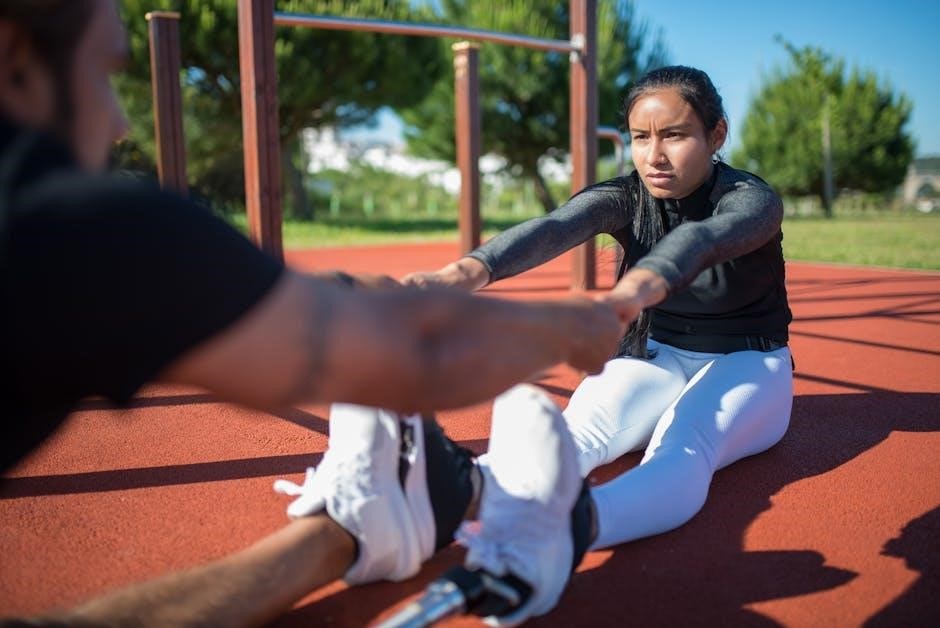Instructional Coach Appreciation Day honors educators who support teachers in improving instructional practices, fostering student growth, and enhancing educational environments through dedicated guidance and professional development.
Definition and Overview
An Instructional Coach Appreciation Day recognizes the vital role of coaches in education, celebrating their dedication to enhancing teaching practices, supporting professional growth, and fostering student success. These professionals partner with teachers to implement research-based strategies, providing tailored guidance and resources to create impactful learning environments. The day highlights their commitment to educational excellence and their integral role in shaping both teacher and student outcomes.
Importance of Recognizing Instructional Coaches

Recognizing instructional coaches is vital for acknowledging their pivotal role in enhancing teaching practices and student outcomes. By supporting teachers’ professional growth, coaches foster improved classroom environments and educational excellence. Their dedication to providing resources, guidance, and innovative strategies deserves appreciation. Celebrating their efforts boosts morale, reinforces their impact, and strengthens the educational community, highlighting their invaluable contributions to both teachers and students alike.

The History and Evolution of Instructional Coach Appreciation Day
Instructional Coach Appreciation Day originated from the growing recognition of coaches’ vital role in education. Over time, it evolved into a celebrated event honoring their dedication and impact on teaching and learning.
Origins of the Appreciation Day
Instructional Coach Appreciation Day traces its origins to the growing recognition of the critical role coaches play in education. Initially, local schools and districts acknowledged their coaches informally. Over time, the appreciation evolved into a formalized day to honor their dedication to professional development and student success, reflecting the broader understanding of their impact on educational excellence and teacher growth.
Growth Over the Years
Instructional Coach Appreciation Day has grown from local initiatives to a widely recognized event. Schools now organize celebrations, often combining them with Teacher Appreciation Week. Social media campaigns amplify its reach, while educators and communities increasingly acknowledge the vital role of coaches. This growth reflects the expanding recognition of instructional coaches’ impact on education and their dedication to fostering teacher development and student success.
The Role of Instructional Coaches in Modern Education
Instructional coaches collaborate with teachers to enhance teaching strategies, analyze student data, and implement effective classroom practices, ultimately improving student outcomes and educational success.

Key Responsibilities
Instructional coaches empower teachers by providing targeted support, such as modeling lessons, analyzing data, and offering feedback to enhance instructional strategies. They facilitate professional development, assist in curriculum design, and help educators integrate technology. Coaches also collaborate with school leaders to identify improvement areas and implement evidence-based practices, ensuring a focus on student-centered learning and continuous growth for both teachers and students.
- Empowering teachers through modeling and feedback
- Facilitating professional development opportunities
- Assisting in curriculum design and implementation
- Supporting technology integration in classrooms
- Collaborating with school leaders for improvement
- Focusing on student-centered learning strategies
Impact on Education
Instructional coaches significantly enhance education by strengthening teaching practices, boosting student performance, and fostering a culture of continuous improvement. Their efforts lead to more effective lesson delivery, improved student engagement, and higher academic achievement. Coaches also support teacher retention and satisfaction, ultimately contributing to long-term educational growth and innovation within schools and districts.
- Enhancing teaching methodologies and student outcomes
- Fostering a culture of continuous improvement
- Supporting teacher retention and professional growth
- Driving innovation in educational practices

How to Celebrate Instructional Coach Appreciation Day
Celebrate Instructional Coach Appreciation Day by organizing school-wide events, recognizing coaches’ contributions, and creating a positive atmosphere of gratitude for their dedication to educational excellence.
- Host appreciation ceremonies or luncheons
- Present personalized gifts or awards
- Share heartfelt testimonials from staff and students
School-wide Events
School-wide events are a great way to celebrate Instructional Coach Appreciation Day. Organize assemblies, themed days, or student-led activities to honor coaches’ dedication. Create banners, host luncheons, or set up recognition stations where students and staff can express gratitude. These events foster a sense of community and highlight the invaluable role coaches play in education.
- Plan a school assembly to recognize coaches publicly
- Host a “Thank You” luncheon or breakfast
- Encourage students to create handmade cards or posters
- Set up a “Coaches’ Corner” with personalized gifts
Individual Recognition
Individual recognition allows for personalized expressions of gratitude. Consider personalized gifts, handwritten notes, or one-on-one acknowledgments. Highlight specific contributions and their impact, making coaches feel valued. This personal touch strengthens relationships and motivates continued dedication.
- Handwritten thank-you notes from students and teachers
- Personalized plaques or certificates of appreciation
- Customized gifts reflecting their personal style or interests
Digital and Remote Celebration Ideas
Digital celebrations allow schools to honor instructional coaches remotely. Virtual events, social media shoutouts, and personalized emails are effective ways to show appreciation and recognize their contributions.
- Host virtual meetups or webinars to celebrate coaches
- Share appreciation posts on school social media platforms
- Send personalized digital cards or certificates
- Organize a virtual appreciation ceremony with speeches and testimonials
- Host a live Q&A session where coaches share their experiences
- Use collaboration tools for interactive activities and recognition
- Share success stories and testimonials on platforms like Twitter or Instagram
- Create engaging content showcasing coaches’ contributions
- Use hashtags to increase visibility and participation
Virtual Events
Virtual events offer a creative way to celebrate instructional coaches remotely. Schools can host webinars, live Q&A sessions, or interactive workshops to honor their contributions. Platforms like Zoom or Google Meet can facilitate these gatherings, allowing staff and students to participate from anywhere. Virtual events foster inclusivity and ensure everyone can join in recognizing the hard work of instructional coaches, making the celebration accessible and engaging for all participants.

Social Media Campaigns
Social media campaigns amplify appreciation for instructional coaches by sharing their impact broadly. Schools can create engaging posts, videos, or stories highlighting coaches’ contributions. Using hashtags like #InstructionalCoachAppreciationDay or #ThankACoach encourages wider participation. Sharing testimonials, photos, and success stories fosters a sense of community and gratitude, making coaches feel valued and recognized for their dedication to education and professional growth.
Personalized Gifts and Tokens of Appreciation
Personalized gifts, such as customized mugs, engraved plaques, or heartfelt photo cards, offer meaningful ways to express gratitude to instructional coaches for their dedication and support.
Creative Gift Ideas
Creative gifts for instructional coaches might include personalized planners, custom bookmarks, or a “Coach’s Survival Kit” filled with coffee, chocolates, and motivational notes. A vision board or memory jar with heartfelt messages from teachers and students can also be meaningful. Additionally, consider gifting a professional development book or a subscription to an educational resource platform, showing appreciation for their dedication to growth and support.
Handmade vs. Store-bought
Handmade gifts, such as personalized cards or memory scrapbooks, offer a heartfelt, unique touch, showing effort and personalization. Store-bought items like engraved mugs or professional books provide practicality and a polished presentation. Both options demonstrate appreciation, with handmade emphasizing thoughtfulness and store-bought highlighting professionalism, allowing the giver to choose based on their relationship and the coach’s preferences.
Sharing Success Stories

Sharing success stories highlights the positive impact of instructional coaches, showcasing their contributions to teacher growth and student achievement, and inspiring gratitude and recognition within educational communities;
Testimonials from Teachers and Students
Testimonials from teachers and students highlight the profound impact of instructional coaches, showcasing their dedication to fostering growth and improvement in educational settings. Many teachers express gratitude for the guidance and resources provided, while students often credit coaches for creating supportive learning environments. These heartfelt stories illustrate the transformative role coaches play in both teaching practices and student success, inspiring appreciation and recognition.
Case Studies of Effective Coaching
Case studies of effective coaching reveal the transformative impact of instructional coaches on teaching practices and student outcomes. Examples include coaches implementing data-driven strategies, fostering collaborative planning, and providing targeted professional development. These studies highlight measurable improvements in teacher confidence, classroom engagement, and student achievement, demonstrating the invaluable role coaches play in advancing education and inspiring appreciation for their dedication and expertise.

The Legacy and Impact of Instructional Coaches
Instructional coaches leave a lasting legacy by supporting educators, improving teaching practices, and fostering student growth, creating a ripple effect that inspires future generations of educators.

Long-term Effects on Schools
Instructional coaches foster sustained improvements in teaching practices, leading to enhanced student outcomes and a culture of continuous improvement. Their support cultivates collaboration among educators, promoting innovative strategies and professional growth. Over time, this leads to measurable advancements in academic performance, teacher retention, and a more supportive learning environment, ultimately transforming the educational landscape for future generations.
Inspiring Future Coaches
Instructional coaches serve as role models, inspiring educators to pursue coaching careers by demonstrating the positive impact of collaborative leadership and professional development; Their mentorship and dedication encourage teachers to embrace coaching as a way to support colleagues and enhance student learning, fostering a legacy of growth and innovation in education.

The Future of Instructional Coaching
The future of instructional coaching involves integrating technology, fostering collaborative learning environments, and adapting coaching strategies to meet evolving educational needs and student demands effectively.
Emerging Trends
Emerging trends in instructional coaching include the integration of technology, personalized learning strategies, and data-driven approaches to enhance teacher effectiveness and student outcomes. Virtual coaching platforms are gaining popularity, allowing for more accessible professional development. Additionally, there is a growing emphasis on trauma-informed coaching practices to support educators in creating resilient learning environments, ensuring holistic support for both teachers and students in modern educational settings.
Technology in Coaching
Technology is revolutionizing instructional coaching by enabling virtual collaborations, real-time feedback, and access to digital resources. Tools like video conferencing and learning management systems facilitate remote coaching, while data analytics help track progress. iPads and educational apps also support interactive learning, making coaching more efficient and accessible for teachers and students alike in diverse educational settings.